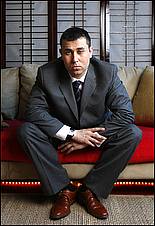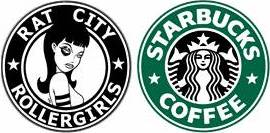Seattle Post-Intelligencer Interviews "Spam King" Robert Soloway
 The Seattle Post-Intelligencer today ran a great feature arising out of “Spam King” Robert Soloway’s first local interview.
The Seattle Post-Intelligencer today ran a great feature arising out of “Spam King” Robert Soloway’s first local interview.
The paper portrayed Mr. Soloway’s story as one of rags-to-riches-to-rags.
He suffers from Tourette’s syndrome and was the unpopular kid in high school. He found social acceptance on the Internet, then lots of money — $700,000 to $800,000 per year once his spam business got going.
As the P-I put it:
“He once thought nothing of jetting to Vegas and tipping a cabbie $1,000.
“But in the year since his May 2007 arrest, he had to find a job and worked for a while in a leather-cleaning factory for $9 an hour. The feds seized his Prada, Versace, Gucci and Armani jackets, forcing him to shop the clearance rack in Macy’s when he needed a winter coat.
“He once owned a fleet of luxury cars, but his last one, a Mercedes SL 500, was repossessed, so he now walks or takes the bus. He eats at McDonald’s. He spends much of his time in the company of his lawyer….”
Despite losing his life in the fast lane, Mr. Soloway says he’s happier than he ever was and that he’s sorry for what he did.
For the most part.
“I’m not minimizing what I did, but the fact is, it is just an e-mail,” he told the paper. “If it does become a nuisance, get a spam filter. You can get them for free.”
STL’s July 22 coverage of the Western District’s sentencing of Mr. Soloway to 47 months in prison here.
Photo credit: Andy Rogers / Seattle Post-Intelligencer
What's the Plural Form of a Trademark?
What’s the plural form of a trademark?
That’s what a reader recently asked a (non-lawyer) blogger with respect to her BLUETOOTH headsets: “What’s the plural form of ‘bluetooth’ now that I have two of them?”
Trick question, of course. There is none.
It’s certainly not BLUETEETH, which is how the blogger responded, after correctly noting that “[t]echnically and unfortunately the pluralized form should be ‘two Bluetooth earpieces.’”
The blogger went on to explain: “In the same way that Xerox, Coke, and Kleenex became synonymous for what their product actually is, Bluetooth has succeeded in being a popular trademark turned into a household name.”
I’m sure Xerox Corp., The Coca-Cola Co., Kimberly Clarke Corp., and Bluetooth SIG, Inc. would beg to differ. Not with their trademarks becoming household names (i.e., famous), but with their marks becoming synonymous for what their products actually are (i.e., generic) — which would render their trademarks unprotectable and hence worthless.
I agree it’s a mouthful to say “two Bluetooth earpieces.” And I’m not one to pick on other people’s (or peoples’) grammar. But using a trademark the right way emphasizes that it is someone’s proprietary brand, not a common word that stands for a type of good.
If everyone understands “coke” to mean soft drink, I need to (1) order a “coke,” and then (2) clarify that I specifically want the cola drink made by The Coca-Cola Company. That’s way too much work!
Now, I don’t order a “COCA-COLA brand soft drink” any more than the next guy. But think of all the information you convey when you put the almost magical efficiency of trademarks to their proper use.
Plaintiffs Didn't Show Bad Faith Needed for Malicious Prosecution Claim
I can’t summarize the facts any better than Chief Judge Alex Kozinski did the Ninth Circuit’s June 30 decision in Fisher Tool Co., Inc. v. Gillet Outillage:
“Defendant Gillet Outillage is a French company that makes hose clamp pliers; it owns French and U.S. patents on the pliers’ design. When Gillet discovered that plaintiffs were selling similar pliers in the United States, the company sued them for patent infringement. But the lawsuit didn’t go as well as Gillet hoped: The [Central District of California] construed the patent’s claims narrowly at a pre-trial Markman hearing, after that setback Gillet dropped the suit, which was then dismissed. Plaintiffs thereupon sued Gillet and its lawyers [and distributor], claiming that Gillet’s lawsuit was a malicious prosecution under California law and a violation of section 43(a) of the Lanham Act and various California tort laws. The district court granted summary judgment to defendants, and plaintiffs appeal.”
As to the Lanham Act claim, the Ninth Circuit found:
“At Gillet’s direction, [defendant’s lawyer] prepared letters, addressed ‘To Whom It May Concern,’ expressing [the lawyer’s] ‘strong opinion’ that plaintiffs’ pliers infringed Gillet’s patent and threatening that Gillet would sue anyone who sold plaintiffs’ pliers. Defendant Mayhew Steel Products, Inc., Gillet’s U.S. distributor, forwarded these letters to its customers. Plaintiffs claim that the letters falsely stated that their pliers infringed Gillet’s patent….”
The court found these facts did not add up to bad faith. Adopting the Federal Circuit’s treatment of the issue, the court held that “where Lanham Act claims and state tort claims are based on a defendant’s representation that someone infringed his patent, plaintiff must show that defendant’s representation was made in bad faith.”
Applying this rule to the facts, the court affirmed the district court’s dismissal:
“[P]laintiffs offer no good reason why the bad-faith requirement should apply only to the patent-older and not also to those who act in concert with him to enforce his patent rights. The purpose of the bad-faith requirement is to permit the patent-holder to assert his rights (in good faith) without fear that he might thereby violate the Lanham Act or state tort laws. And, to assert his patent rights, a patent-holder will often need help. Here, for instance, Gillet relied on its lawyers to draft the letters; it relied on its U.S. distributor to forward those letters to retailers. Because [the defendant’s distributor and lawyer] acted in concert with Gillet, the patentholder, to recover against them plaintiffs must show that they acted in bad faith,” which the court found plaintiffs failed to do.
The case cite is Fisher Tool Co., Inc. v. Gillet Outillage, 530 F.3d 1063, Nos. 06-55996 and 06-56165 (9th Cir. June 30, 2008).
Records Show Starbucks Hasn't Yet Opposed Rollergirls' Logo

I hope I’m not jumping the gun here, but it looks like Starbucks Corp. isn’t opposing the Rat City Rollergirls’ application to register its logo as a trademark after all.
In May, STL reported (among others) that Starbucks had filed for an extension of time to oppose the Seattle roller derby league’s application through July 16. That date has come and gone, and the Patent and Trademark Office’s database doesn’t indicate that Starbucks has opposed or sought another extension of time to do so.
Online media seemed pretty critical of Starbucks’ initial extension. Perhaps the company has backed off. Or settled with the ‘girls.
STL can only speculate.
Olympic Cellars and USOC Settle "Olympic" Trademark Dispute
 The Seattle Times reported yesterday that the United States Olympic Committee and the Olympic Peninsula’s Olympic Cellars Winery have entered into a settlement in which the winery will keep its “Olympic” name and domain name on the condition that its “wine sales east of the Cascade Mountains are not ‘substantial.’” (Previous STL coverage here.)
The Seattle Times reported yesterday that the United States Olympic Committee and the Olympic Peninsula’s Olympic Cellars Winery have entered into a settlement in which the winery will keep its “Olympic” name and domain name on the condition that its “wine sales east of the Cascade Mountains are not ‘substantial.’” (Previous STL coverage here.)
The Times was not privy to other terms of the agreement.
The settlement appears to mirror the language contained in the Ted Stevens Olympic and Amateur Sports Act, 36 U.S.C. § 220501, et seq., which vests the USOC with a near monopoly on the word “Olympic.” Section 220506(d) of the statute excepts trade names and trademarks when “it is evident from the circumstances that such use of the word ‘Olympic’ refers to the naturally occurring mountains or geographical region of the same name that were named prior to February 6, 1998, and not to the corporation or any Olympic activity” and “such business, goods, or services are operated, sold, and marketed in the State of Washington west of the Cascade Mountain range and operations, sales, and marketing outside of this area are not substantial.”
Despite the settlement, Olympic Cellars remains unhappy. Its Web site states:
“By forcing Olympic Peninsula businesses to be local in nature and restricting sales to the Olympic Peninsula, it unjustly limits our ability to grow, be competitive and survive. Sure, we could change our business names. It certainly would be easier, cheaper and less hassle. But that means shedding our heritage as well; basically giving in and giving up. And we just can’t do that.
“It makes far more sense for the USOC to simply limit its investigation to activities and companies outside the Olympic Peninsula using the mark OLYMPIC, and sue those who would try to create an association with, or trade upon the goodwill of the USOC, the U.S. Olympic Team or the Olympic Games for commercial use.
“Unfortunately, the bigger picture has been lost.
“Contrary to what the USOC claims, there is no confusion as to whether the name ‘Olympic’ refers to one of our businesses, the Peninsula where we’re located or the Olympic Games themselves. When you hear the name ‘Olympic Cellars Winery’ is your first thought of a swimmer racing across the pool at the Olympic Games? I don’t think so.
About the only way one of our local businesses could ever escape the harassment of the USOC is to become a giant like AT&T, VISA, McDonalds, Nike, Bank of America or Anheuser-Busch and actually help sponsor the Olympics! And they’ll need to do that without the help of national recognition or basic use of the Internet. When someone pulls that off, I’ll be the first to raise a glass of Vino.”
I completely agree.